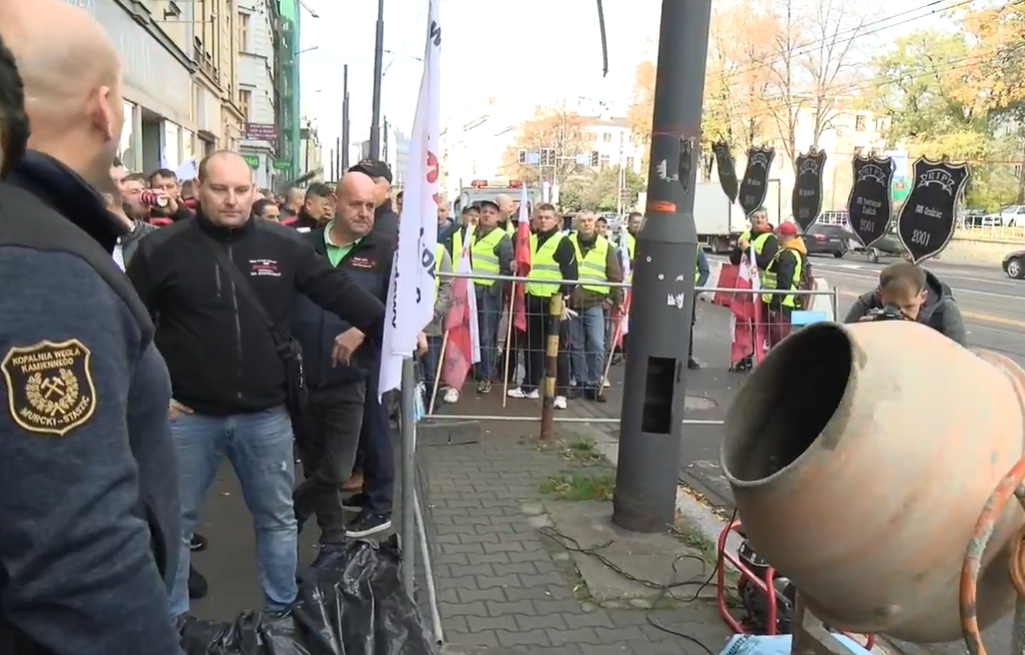A trade union representing miners today attempted to brick up the entrance to Prime Minister Mateusz Morawiecki’s parliamentary office. They criticise his administration for not allowing more mining of coal in Poland to ease the current energy crisis, and instead importing it from abroad.
Morawiecki, however, denies that his government has neglected the issue, saying that “the price of coal keeps me awake at night” and that the problem has been caused by Russia’s invasion of Ukraine.
Związkowcy z Sierpnia 80 od września pikietują pod katowickim biurem Mateusza Morawieckiego pytając o obiecany tani węgiel. Zapowiedzieli że zlikwidują biuro którego utrzymanie kosztuje kilkadziesiąt tys. miesięcznie a nikt z niego nie korzysta. Zagrozili że zamurują wejście. pic.twitter.com/8pOrqfWftT
— Piterson (@Piterson1980) October 24, 2022
Bogusław Ziętek, head of the WZZ Sierpień 80 union, notes that they have been coming every week for two months to protest at Morawiecki’s offices in Katowice, which is the capital of Poland’s coal-mining heartlands of Silesia.
“We have never found Morawiecki [here],” he said, quoted by the Polish Press Agency (PAP). “The office, which is empty, is not necessary to anyone…[but] costs us thousands of zloty a month…[So] it is today being walled up.”
His union brought a concrete mixer and bricks to carry out the action. However, they were prevented from entering the building by police.
Atak zwiazkowcow na biuro poselskie premiera Morawieckiego, chcieli zamurowac biuro 😱 pic.twitter.com/H8TVwKBozN
— zosiaa-16 (@16Zosiaa) October 24, 2022
“Morawiecki is a fraud and a coward,” added Rafał Jedwabny, the union’s leader in Polska Grupa Górnicza (PGG), Poland’s state-owned mining group. He accused the prime minister and the climate minister, Anna Moskwa, of falsely claiming that Poland has enough supplies of coal to provide it at affordable prices.
As part of its protests, the union has asked people to “queue for cheap coal” outside Morawiecki’s office in Katowice. It argues that, despite government assurances, many households – one third of which use coal for heating – are struggling to obtain the fuel.
Poland, which has large supplies of coal beneath its soil, should “not be an importer of coal from abroad that is ten times more expensive and not really suitable for the individual [consumer] market”, said Jedwabny, quoted by PAP. Instead, it should “rebuild our mining industry”.
During today’s protest, the unionists displayed cemetery-style “RIP” plaques with each naming a Polish coal mine closed in recent decades.
Katowice. Kilkadziesiąt osób protestowało w poniedziałek rano przed biurem poselskim Mateusza Morawieckiego. Górnicy i związkowcy przynieśli ze sobą taczkę oraz opony, a następnie ustawili się w "kolejce po węgiel". Akcja ma się odbywać w każdy poniedziałek o godz. 9:00. pic.twitter.com/dUuGE87kaP
— tarnogorski.info (@TGtarnogorski) September 19, 2022
In response to the protest, Morawiecki – who was visiting an airbase in the town of Łask – denied that his government has been complacent or ineffective in responding to the energy crisis.
“I have not devoted as much time to any other issue in the last three months as to coal and energy issues,” he said, quoted by news website Interia. “The price of coal keeps me awake at night.”
He noted that he has already held meetings with “many trade unions”, and said that he was “open to further meetings [with] those who are very critical”, reports Energetyka24.
The prime minister also pointed to the fact that coal prices are rising globally as a result of Russia’s war in Ukraine. “We [the government] are fighting for availability by ordering coal from all over the world. We are doing everything to secure coal, gas and electricity supplies.”
The price of coal in Poland recently reached an average of 3,000 to 4,000 zloty per tonne, around four times higher than last year’s prices of 800 to 1,000 zloty per tonne, notes industry website MuratorPlus.
The government has taken a number of steps to address the issue, including introducing special one-off allowances for households to buy fuel for heating this winter. Last week, parliament approved a price cap of 2,000 zloty per tonne for households to buy 1.5 tonnes of coal this year and the same amount next year.
Poland remains the EU’s most coal-dependent state, using the fossil fuel to generate around 70% of its electricity. However, in recent years the ruling Law and Justice (PiS) party, though long friendly towards the mining sector, has moved to begin phasing out coal, prompting protests from some miners.
Main image credit: Silesia24.pl/Facebook (screenshot)

Daniel Tilles is editor-in-chief of Notes from Poland. He has written on Polish affairs for a wide range of publications, including Foreign Policy, POLITICO Europe, EUobserver and Dziennik Gazeta Prawna.




















